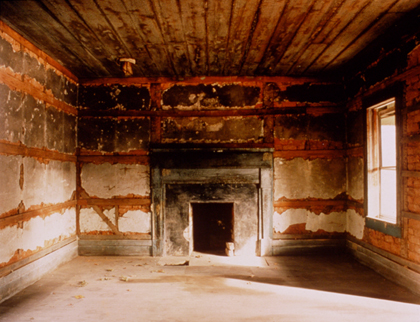House: Charged Space
June 11–September 16, 2001
Whatever
a house is to the heart and body of man - refuge, comfort, luxury - surely
it is as much or more to the spirit. Think how often our dreams take place
inside the houses of our imaginations!
—Mary Oliver

E-book
Images of houses contain powerful psychologically and emotionally charged associations. In his writings, C. G. Jung (1875-1961) used a multi-storied house as an analogy for the human psyche: "We have to describe and to explain a building, the upper story of which was erected in the nineteenth century; the ground-floor dates from the sixteenth century, and a careful examination of the masonry discloses the fact that it was reconstructed from a dwelling-tower of the eleventh century. In the cellar we discover Roman foundation walls, and under the cellar a filled-in cave, in the floor of which stone tools are found and remnants of glacial fauna in the layers below. That would be a sort of picture of our mental structure." Painted with a broad brush, this image opens our imagination to both the complexities of the human mind and the potentially rich associations of houses.
In another essay Jung credits a dream, containing an image of a house, with one of his important psychoanalytic discoveries: "One [dream] in particular was important to me, for it led me for the first time to the concept of the collective unconscious . . . This was the dream. I was in a house I did not know, which had two stories. It was my house." Our houses are the protected environments that we dream in, and through our dreams find evidence of ourselves.
The poetic imagination of space, which Gaston Bachelard has explored in literature, is a useful concept for examining space in the visual arts. Bachelard writes, "Space that has been seized upon by the imagination cannot remain indifferent." We transform space into containers of our desires and fears. Whatever the specifics of our own experience, from the country dwelling, to densely stacked urban apartments, or to suburban sprawl, each of us carries an archetypal image of the house. As Bachelard puts it, "all really inhabited space bears the essence of the notion of home," where the imagination "comfort[s] itself with the illusion of protection." Imbued with associations of "home", images of houses invite viewers to explore their own musings, forgotten moments, and unconscious leaps.
An image of a house evokes the domicile of your adolescence and childhood.
Bachelard argues that when we remember "space is everything, for time
ceases to quicken memory. Memory‹what a strange thing it is!‹does not
record concrete duration . . . For a knowledge of intimacy, localization
in the spaces of our intimacy is more urgent than determination of dates."
The spaces of our home become the touchstones of our early memories. We
experience these moments of our past not as a series of factual records,
but as daydreams which combine memory with flights of imagination. Bachelard
writes, "it is because our memories of former dwelling-places are relived
as daydreams that these dwelling-places of the past remain in us for all
time."
The house contains a variety of spaces, each with its own potential reading.
Each room has separate associations; attics evoke a different response
than bedrooms, kitchens, hallways or basements. While the interior spaces
can have associations with the protected innocence of youth, they can
also be confining, or on occasion threatening. Likewise, the exterior
of a building gives us clues to what it previously contained: isolated
lives, perhaps communal embrace, the warmth or trauma of family. Each
building contains a history of its inhabitants, an archaeology of memories,
a few explicit, others implied, some lost.
Because our houses contain powerful associations, houses have enormous
appeal to visual artists. In this exhibition, four contemporary artists
from New England, Fritz Buehner, Bruce Monteith, Shellburne Thurber and
Mark Wethli explore the psychologically charged image of the house.
—ALSTON CONLEY

